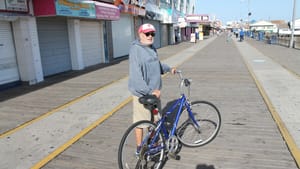Stay in the Loop
BSR publishes on a weekly schedule, with an email newsletter every Wednesday and Thursday morning. There’s no paywall, and subscribing is always free.
Those who can, do; those who can’t, attend film schools
Lessons from the Cape May Film Festival

The other weekend I attended the New Jersey Film Festival in Cape May. As film festivals go, Cape May’s is one of the best to attend because of its small repertoire (32 films) and scenic accommodations (the historic Chalfonte Hotel, built in 1876). But George Bernard Shaw’s adage— “Those who can, do; those who can't, teach”— was shouting silently every film by a graduate student, while the festival’s best films came from directors with no academic pedigree.
Call it an unintended consequence of knowing too much and understanding nothing. A good movie does more than project— it connects.
To be sure, Stanford University’s four submissions were beautifully edited, but all were cases of style over substance. A 12-minute take by a Bryn Mawr student subjected me to a perfectly filmed abstract on why a sensitive college student can’t stand to be around her parents and her utterly boring summer job dealing with idiots who never read Sartre.
Nothing happens, mind you: She doesn’t kill her parents or stick a mouse in a customer’s take-out bag. She just goes on and on about her boredom.
Job market
Then there was an obligatory mime movie by a graduate of the University of California at Santa Barbara. Note to all those who aspire to creative achievement: Never— I say never— use, show, depict or unfold a mime in a short; not unless you also intend to kill it or stick it in a bag.
Apparently film schools, in order to justify their outrageous tuitions, have told students to pursue documentary cinema making in earnest because, upon graduation, one can secure a job making training films for the Army or the CIA. Also, to judge from the films I viewed, students have been taught just to hold the camera upright and not editorialize. But all good art editorializes. In great art, it just isn’t noticed.
Beyond neurosis
Not surprisingly the three movies which generated the most interest were made by a writer (BSR contributor Bob Ingram in Boardwalk II, his second installment about Wildwood’s legendary Boardwalk), a photographer (Henri Washington, in Run Claire Run, his touching homage to his wife, long distant runner), and a songwriter (Gordon Vincent’s depiction of his lyrics about the silliness of materialism in Ali Casablanca).
What distinguished three films from the perfectly edited, beautifully filmed sketches about a film camp and a woman living in a doll house?
I found them riveting because they had the ability to understand other than the director’s ego, to show insight into other people’s conditions, to make us laugh, feel sorry, wonder and just enjoy by seeing ourselves through the characters. These documentaries had engrossing stories to tell— in each case stories that transcended the filmmaker’s myopic preoccupation with his own gears and neuroses.
In short, these films had a heart and a soul— commodities you can’t pick up even in an advanced class in cut-and-paste.
What, When, Where
Cape May Film Festival. October 25-27, 2013 at Chalfonte Hotel, Cape May, N.J. www.njstatefilmfestival.com.
Sign up for our newsletter
All of the week's new articles, all in one place. Sign up for the free weekly BSR newsletters, and don't miss a conversation.

 Jackie Schifalacqua
Jackie Schifalacqua